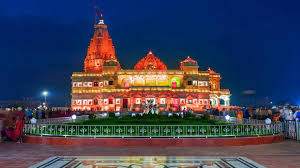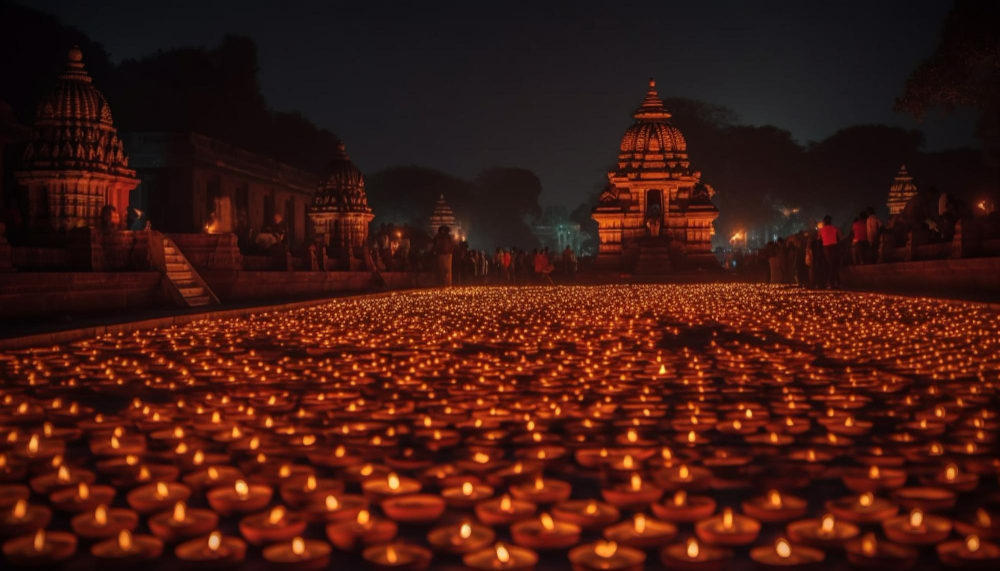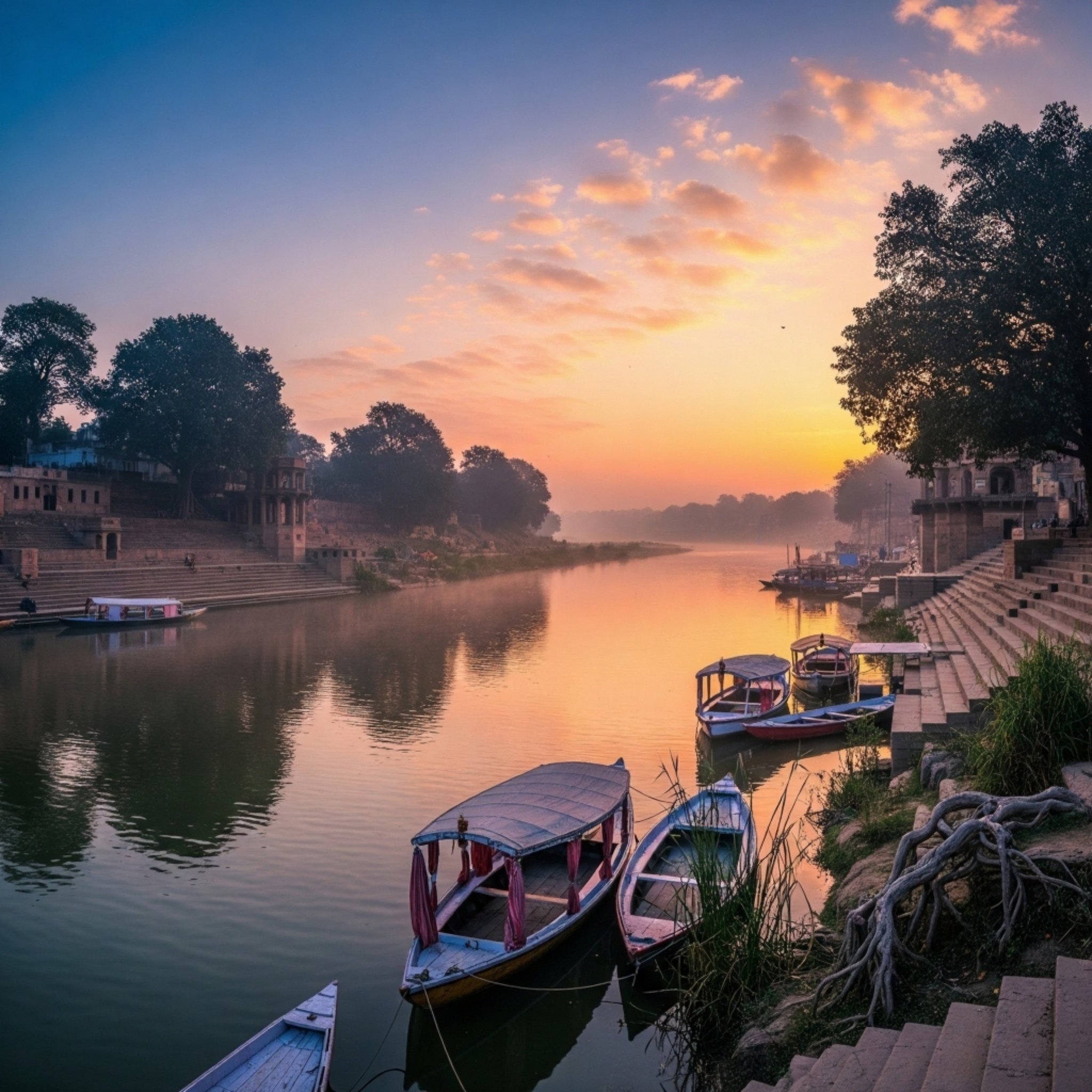1. The Riverside Retreats and Quiet Ghats (Sarayu River)
Some of the most peaceful places to visit in Ayodhya are the ghats along the Sarayu River, which are less crowded. Some quiet steps lead away from the busy Dashrath Ghat. The peepal trees provide them with shade, and the morning mists on the water make it a pleasant place to think. These locations are ideal for escaping everyday life and observing local customs, such as priests performing silent rituals and fishermen casting their nets.
2. Not very well-known, quiet temples (Ram ki Paidi)
There are many small shrines and family-run temples along the winding roads near Ram Ki Paidi that make you feel devoted. Hidden behind a bustling market, one of these temples boasts a faded mural depicting Lord Rama in his childhood. There is a little-known shrine nearby, and its bell is not often rung. The inside is only lit by one lamp. These serene locations in Ayodhya encourage you to pause and appreciate the tranquility of the spirit.
3. Less Known courtyards and buildings in the haveli style
You can see haveli-style homes and courtyards that used to belong to rich merchants as you walk through the old parts of town. Some of these have been turned into community centers where older people can come together to eat or tell stories. Partly open, fancy wooden doors with flower patterns encourage you to explore centuries-old buildings and learn about the area's history.
4. The Old Libraries' Walls That Whisper
There is a small, unassuming library next to a temple that has manuscripts and rare prints of devotional poetry. There are fragile palm-leaf copies of the Ramayana and local poetry collections on the shelves. These books tell stories about duty, devotion, and fate. These locations are quiet places to visit in Ayodhya, serving as a treasure trove for those who love books and history.
5. Gardens That Talk About Royal Support
Local nawabs once used a walled garden behind sandstone walls. There are paths that go to hidden benches and a broken pavilion under the shade of citrus trees and bougainvillea. This garden is one of the most peaceful places to visit in Ayodhya that most tourists miss. In the distance, you can hear leaves rustling and chanting.
6. The Ram Ki Paidi at Dawn
Ram Ki Paidi is a well-known ghat and one of the best places to visit in Ayodhya, but the experience is different when you go in the morning. As the sun rises, pilgrims bathe in the holy Sarayu, oil lamps float like stars, and the city wakes up to hymns carried by the cool breezes of the river. The early morning quiet makes a well-known place seem like a secret.
7. Ruins from the Brick Age that aren't on the tourist path
On the outskirts of Ayodhya, old brick buildings, possibly constructed during the Gupta period, sit quietly among scrub and grass. Few visitors use this rugged path to reach here. The arches have stood for many years, and moss has covered the walls. This is one of the best places to visit in Ayodhya, and these ruins are among them.
8. The Story Courtyard
Some families tell stories in their courtyards at night, using lanterns to light the way. Older people tell stories about the wise men, kings, and river spirits who live nearby. These small, unplanned get-togethers are rare and give you a magical look at oral tradition. Folklore fans will love these places to visit in Ayodhya.
9. The Old Wells and Stepwells
Hidden away in quiet lanes are a few abandoned stepwells, known as baolis. They have carved stone stairs that lead down to deep water. Some of them even have small shrines hidden in the corners. People who participated in communal water rituals used to live in these buildings. These are the places to visit in Ayodhya, where you can feel as if you're walking through history.
10. The Alley of the Craftsman
In a less well-known part of town, artisans work in dark courtyards making traditional brass lamps, hand-painted idols, and small scenes from the Ramayana. People can walk through narrow streets, see metalworkers shape metal, and see painters add tiny details to their work. You can take a close look at how culture is made and places to visit in Ayodhya.
11. Quiet ashrams and places to meditate
There is an ashram hidden in a grove away from the crowds. Every day, monks in saffron robes meditate in silence while bells ring. This hidden spot is a wonderful place to escape the noise and is one of the calmest places to visit in Ayodhya. People who come can sit, watch, or join a group chant in silence that is respectful.
12. The Market Lanes That Smell Like Spices
The spice lanes of Ayodhya have fragrant surprises, like piles of saffron threads, cardamom pods, and rose petals. In the middle of the market's noise, small stalls sell old medicines and burn incense. These fragrant places to visit in Ayodhya are fun for all the senses and let you try the area's food and medicine traditions.
13. A secret terrace with views of the sunset
A winding stair leads to a rooftop terrace on top of a merchant's house. The terrace has great views of the Sarayu's golden curves at sunset, as well as domes and temple spires. The sky turns pink and copper, which makes the view look like something out of a movie. This terrace is definitely one of the best places to visit in Ayodhya to take pictures for postcards.
14. The Temple Garden That No One Remembers
A small temple sits amidst a garden that hasn't seen maintenance in a long time. The overgrown plants conceal the stone idols. Lilies are floating in a pond in the middle, and the paths are covered in moss. There aren't many people who come here. The scents of the flowers, the hovering dragonflies, and the gradual deterioration create a mystical atmosphere. It's one of the few destinations in Ayodhya that remains untouched.
15. The boat rides on the Floating Blossom
There are times of the year when little boats with marigolds on them float peacefully on the Sarayu. People who are on a pilgrimage or selling things pass by. They are carrying flowers and are quiet with low lights. The petals that are floating on the water make you think. Even though they are based on tradition, these calm trips are still some of the best places to visit in Ayodhya.
Conclusion
Ayodhya is known for its spiritual significance, but there are also hidden gems that show a more peaceful side of the city. There are many other fascinating places to visit in Ayodhya besides the ones you already know about. There are quiet ghats, hidden shrines, ruins that are hundreds of years old, fragrant lanes, and courtyards where people tell stories. Each hidden location holds a tale to share and a memory to anchor in your heart.
Walking these less-traveled paths can help you connect with other people, whether it's through a whisper of devotion, a brush with history, a moment of calm, a shared craft, or a fleeting glimpse of dawn light. These hidden gems tell you to walk softly, listen carefully, and let the city's deeper spirit show itself.
Frequently Asked Questions (FAQs)
Q1: Ayodhya: What does "hidden gems" mean?
Hidden gems are places in Ayodhya that aren't as well-known or busy. These could be secluded ghats, small temples, courtyards, stepwells, artisans' courtyards, hidden gardens, or places where people tell stories. These are places to see that aren't on the main tourist route.
Q2. Are these secret places safe and easy to access to?
Most hidden places are safe and located in neighborhoods that are easy to access on foot. Exploring during the day is the best option. Wear comfortable shoes and consider hiring a local guide who is familiar with the back streets and alleys. When you go to small temples, workshops, or restaurants, you should be polite to the people and the culture.
Q3: Are you allowed to take pictures in these places?
Individuals generally do not object when photographs are taken in public areas such as ghats and lanes. However, it is polite to ask for permission before using private courtyards, artisans' workshops, or small shrines. In spiritual or residential settings, a courteous inquiry ensures mutual respect.
Q4. What time of year is best to search for places to visit in Ayodhya?
The best times to visit are in the morning and late in the day. In the morning, the tranquility reveals sacred rituals and the stillness of the river. In the evening, the sunset occurs and the soft light appears. Some craft workshops are open during the day, and at night, there may be storytelling sessions.
Q5: Can these hidden places be added to the regular schedule?
Yes, for sure. Many of these hidden spots are in or near places that tourists go. If you walk from Ram Ki Paidi through the nearby lanes, you can uncover artisan alleys, quiet temples, courtyards, or hidden gardens. These are excellent things to add to a regular tour.
Q6: Are these hidden places good for families or groups?
Yes. Some secret places are quiet and beneficial for thinking, so they're ideal for exploring by yourself or with a small group. Also, like artisan clusters or courtyards, they are fun to go to with family. In quieter areas, it's best to move slowly to keep things calm.
Q7: Is there a "hidden gem" that people who love history should know about?
History fans will love the old brick ruins and the library full of old books. These sites have real ties to the past, including old buildings, rare books, and pieces of murals that are rarely seen in Ayodhya.







